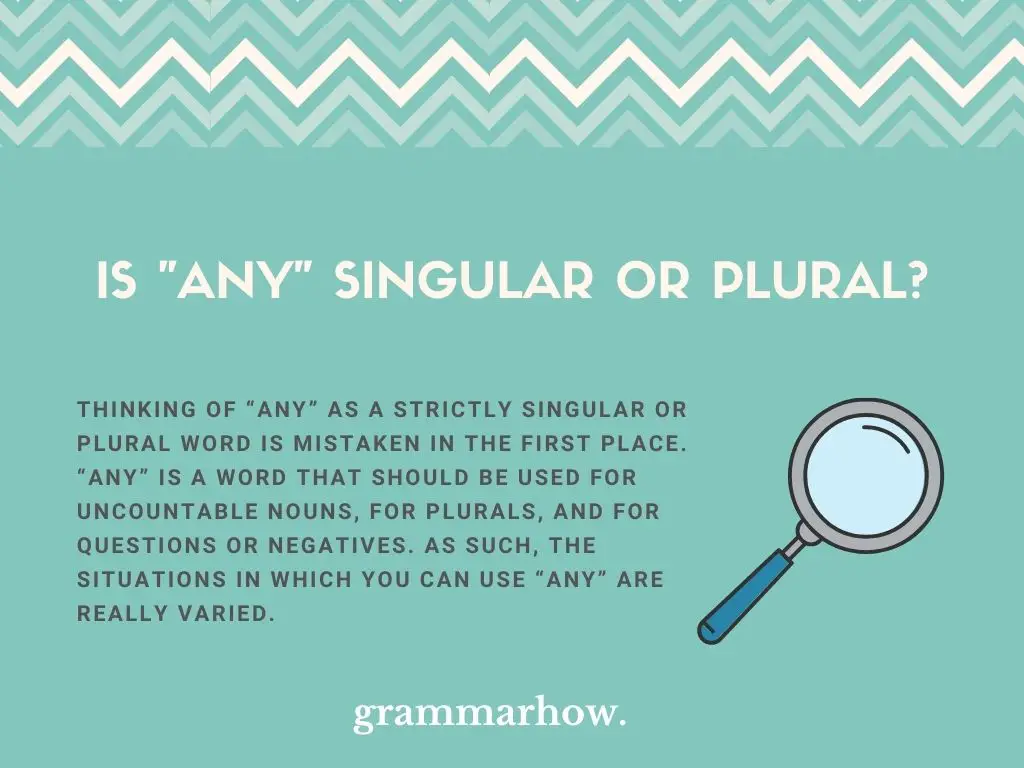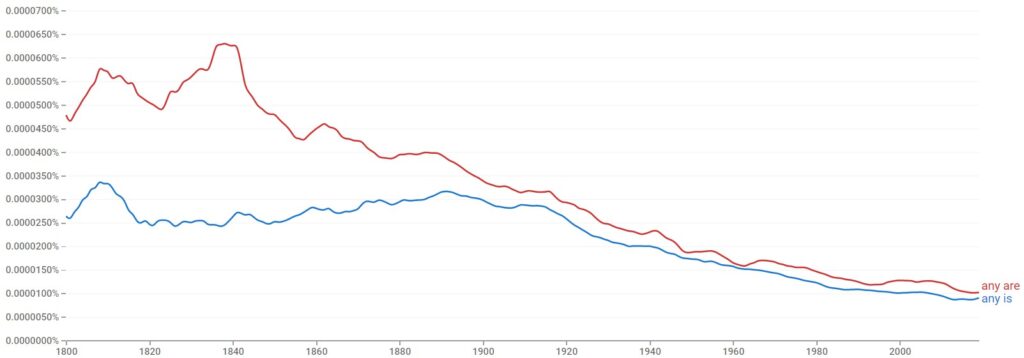Very often, the English language can be confusing. Is the word “any” singular, or is it plural? Does it simply take the form of the word that it’s attached to? And can you use the word “any” in any given situation? This article will answer these questions.
Is “Any” Singular or Plural?
Thinking of “any” as a strictly singular or plural word is mistaken in the first place. “Any” is a word that should be used for uncountable nouns, for plurals, and for questions or negatives. As such, the situations in which you can use “any” are really varied.

The truth is that “any” can be used with plural nouns pretty much all of the time, but it can only be used with singular nouns under specific circumstances, such as a question.
“Any” + Singular
You only use “any” with a singular noun when it’s either an uncountable noun, or when it’s used inside a question or in a negative sentence. These are very specific circumstances, and might be somewhat hard to remember, but they’re very useful to keep in mind.
It’s fine to use “any” with a singular noun as long as it fits the described circumstances and, to put it in a broad way, sounds good to the ear.
To explain the “negative sentence” part, you wouldn’t say “I have any idea”, but you would in fact say “I don’t have any idea”. The singular “any” only makes sense in this context
Here are a few example sentences that will show the way in which you can use “any” with a singular noun:
- Do you have any idea of what might have happened the other day?
- I don’t have any water left but I can offer you some soda instead.
- Is there any chance of me getting accepted in spite of all these circumstances?
- I don’t think there’s any music that you would like in this specific collection.
- Have you had any luck setting up the sound system correctly?
- I don’t know that there’s any difference between either of the final choices for the program.
- Have you got any idea of what we could do to solve this?
“Any” + Plural
Using “any” with a plural noun is not that different when compared to using “any” with a singular noun. You simply add it before any given plural noun, and you use it in sentences that have questions or are negative.
When it comes down to it, the rules for using “any” with a singular or plural noun are very similar.
WIth plural nouns, the major difference would simply be that uncountable nouns are not as major of a presence as they are for when “any” is modifying a singular noun.
Here are some example sentences that will showcase the ways in which “any” can modify plural nouns:
- He doesn’t have any books that deal with this specific subject matter.
- I haven’t got any ideas for the meeting this friday, and I’m worried about it.
- Are there any novels you think I would like from this particular bookstore?
- Do you have any movies from the festival that was held last year in this venue?
- Are there any concepts from the productivity meeting that you think we need to work on?
- I don’t have any essays or papers from last year that are about economics.
- There aren’t any tiles or drawings that we can use as a showcase for the investors.
Is “Any” Mostly Used as Singular or Plural?
The information supplied by the Google Ngram Viewer on the use of “any are” as compared to “any is” is fascinating. Since the year 1800, “any are” has consistently been more popular than “any is”, but this gap has lessened over the years.

Though at the start of the 1800s the gap between “any are” and “any is” was immense, by the start of the 1900s this wasn’t the case anymore.
In the 1900s “any are” was still very much the most common option, but “any is” was always trailing just slightly behind, with what was really a very minor difference overall.
In fact, there was a specific point in the year 1962 in which “any is” nearly overtook “any are” in use, though of course this did not end up happening ultimately.
Is Any or Are Any?
This particular phrasing is used mostly in questions, and the correct answer is normally going to be “are any”. When “any” is used in this particular way, following a verb, then “is any” is generally considered to be incorrect in most cases, and “are any” is utilized instead.
While “is any” can technically be correct in specific contexts that are not questions, when it comes to asking questions it’s seen as awkward and incorrect.
Here are a couple of examples to understand how you can correctly use either option:
- The new project is any of the following options: Large, bold, aggressive, and brave.
- Are any of the new course options doable for someone in my major?
You may also like:
“Is There Any News” or “Are There Any News”? (Correct Version)
Are There Any vs. Is There Any – Easy Usage Guide (+14 Examples)
“If There Is Any” vs. “If There Are Any” – Correct Version

Martin holds a Master’s degree in Finance and International Business. He has six years of experience in professional communication with clients, executives, and colleagues. Furthermore, he has teaching experience from Aarhus University. Martin has been featured as an expert in communication and teaching on Forbes and Shopify. Read more about Martin here.
